 Abraham Lincoln
If given the truth, the people can be depended upon to meet any national crisis...
Abraham Lincoln
If given the truth, the people can be depended upon to meet any national crisis...
 Guildford news...
for Guildford people, brought to you by Guildford reporters - Guildford's own news service
Guildford news...
for Guildford people, brought to you by Guildford reporters - Guildford's own news service
Survey Reveals Unprecedented Challenges Facing Charity And Community Groups
Published on: 20 May, 2020
Updated on: 21 May, 2020
Charities and community groups throughout Surrey are facing unprecedented challenges due to the impact of the coronavirus, according to a survey released on Tuesday this week (May 19).
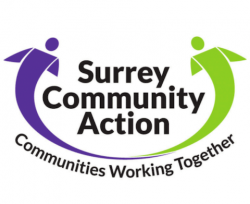 Surrey Community Action, a charity that supports and gives advice to voluntary and not-for-profit groups and based in Burpham, has, over the past few weeks, carried out research to paint a clear picture of the short- and medium-term impact of Covid-19 on Surrey’s voluntary, community and faith sector (VCFS).
Surrey Community Action, a charity that supports and gives advice to voluntary and not-for-profit groups and based in Burpham, has, over the past few weeks, carried out research to paint a clear picture of the short- and medium-term impact of Covid-19 on Surrey’s voluntary, community and faith sector (VCFS).
The survey has revealed some have been able to respond to the challenges with new services and activities, while others have faced catastrophic drops in funding and are having to close services or even face total closure.
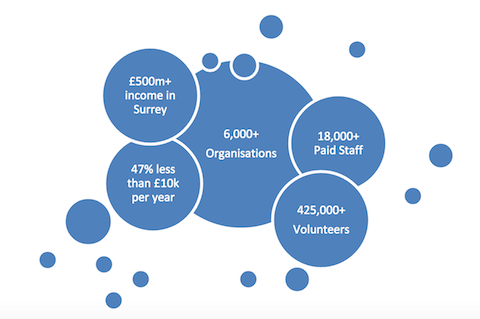 90% of charities and not-for-profit groups in Surrey expect to lose income in 2020-2021, while less than half are confident that their organisation will survive the crisis.
90% of charities and not-for-profit groups in Surrey expect to lose income in 2020-2021, while less than half are confident that their organisation will survive the crisis.
However, the survey has also revealed some positive developments that can be carried forwards once the pandemic has passed including new ways of working and delivering services, stronger partnerships and a surge of volunteers.
The data was collected by telephone interviews and an online survey that was also shared by partner networks. Therefore, the total number of recipients is unknown, but is estimated to be at least 1,200 out of the estimated 6,000-plus voluntary sector organisations active across Surrey.
188 survey responses were received, along with direct data from a further 65 organisations.
Part 1 of its report on the survey can be read by clicking here.
Some of the key points are given below along with quotes from individual respondents shared anonymously.
Confidence of survival
Some organisations involved in health and care work have seen demand for their services rise sharply, whilst others have seen demand fall equally sharply.
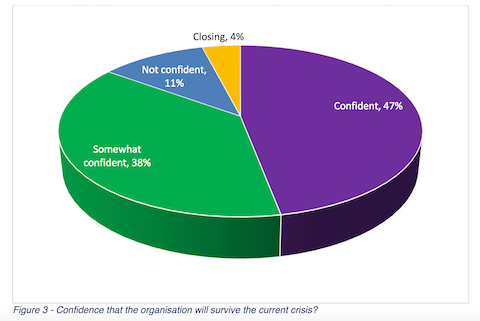 However, when asked about their confidence of surviving the current crisis, almost half were confident of survival. Conversely, around one in 10 were not confident, and around 4% expect to close.
However, when asked about their confidence of surviving the current crisis, almost half were confident of survival. Conversely, around one in 10 were not confident, and around 4% expect to close.
“I honestly don’t know if we will survive. I am the only member of staff and I’m unable to be paid properly at the moment as there aren’t enough funds. If I’m not paid then I will lose my home which is also the headquarters of the charity, providing free storage, power, phone lines etc,so the charity would have to close.” Founder of an autism charity.
Income
Of those organisations expecting income to be unaffected, they are comprised of small organisations that are completely volunteer-run with minimal overheads; larger organisations delivering contracts for statutory organisations including local authorities and health structures.
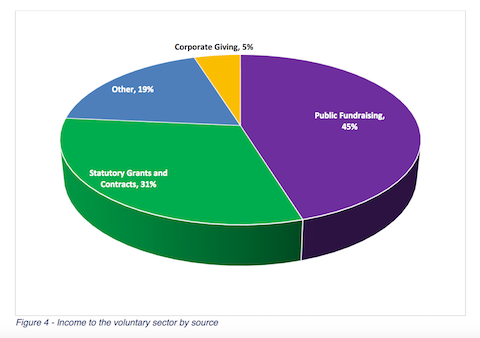 Those expecting to lose all of their income are comprised of organisations that rely on service income, such as community buildings that rely on room hire; organisations who rely exclusively on one or two contracts that have now been withdrawn.
Those expecting to lose all of their income are comprised of organisations that rely on service income, such as community buildings that rely on room hire; organisations who rely exclusively on one or two contracts that have now been withdrawn.
“We will survive, I feel confident of that. We had saved money for a big future project that will have to go on hold in the meantime. We’re applying to different pots of funding as soon as they open. The furlough scheme is definitely a bonus, although our wage bill is quite low it all helps. We value our staff very much and we’ll do whatever we can to keep them.” Trustee of a learning disability charity.
Staffing and mangement
In Surrey, around 24% of paid VCFS staff have been put on furlough. Smaller organisations are less likely to furlough staff, having less capacity to do so and fewer eligible roles; only 12% of such organisations are accessing the scheme.
For larger charities employing more than 10 people, the average furlough rate is 30%, but this figure is skewed, as it includes organisations delivering contracts on behalf of public organisations that have relative security of income. One organisation employing 100 people has furloughed no staff at all, having no need to do so, whereas another charity employing over 500 people has had to place 96% on furlough.
“We’ve furloughed everyone, except for one member of staff. The furlough has helped – I expect we’ll be able to get by for the next six months but if they stop the furlough scheme before they lift the lockdown for the arts and entertainment sector then that’ll be very different.” Chairman community theatre venue.
Voluntary, community and faith sector (VCFS) capacity
The Covid-19 pandemic has led to a massive rise in the number of people wanting to volunteer.
Motivations vary, but include wanting to give something back, and looking for something meaningful to do while in lockdown or on furlough.
As part of its response to Covid-19, the UK Government launched a request for volunteers to help the NHS on March 24,with a target of recruiting 250,000 volunteers.
When the volunteer application portal was paused on March 29, over 750,000 people had registered to become volunteers.
Estimates vary, but as of the end of April, only 20,000 of volunteer tasks had been completed by these volunteers.
There is a similar picture within many Surrey VCFS organisations, in which the local Centres for Voluntary Service (CVS’s) have seen many volunteers offering support but there has not been enough need for those volunteers up to now.
It is believed that in most cases, family and local communities are looking after the needs of many of the more vulnerable members of their communities, meaning that an anticipated demand for additional volunteers has not materialised.
VCFS organisations therefore face a challenge in making sure that these potential volunteers are not disenfranchised and lost to the sector, especially as we may see an increased need as lockdown restrictions are revised and many volunteers may be returning to work, etc.
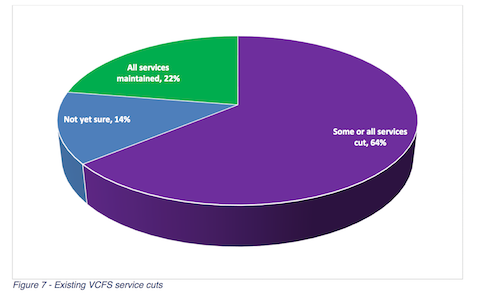 An estimated two-thirds have had to cut some or all of their services, with a further 14% unsure whether they may have to cut services imminently. This comes at a time when half of them are experiencing an increase in demand for their services. These cuts are in addition to the 4% of organisations that have closed or are expected to close imminently.
An estimated two-thirds have had to cut some or all of their services, with a further 14% unsure whether they may have to cut services imminently. This comes at a time when half of them are experiencing an increase in demand for their services. These cuts are in addition to the 4% of organisations that have closed or are expected to close imminently.
However, existing VCFS organisations have devised new ways of delivering their existing services, for example moving face-to-face mentoring sessions to virtual meetings. Some have broadened their range of beneficiaries to allow more people to access their services during the pandemic.
There have also been many new “mutual aid” groups formed to meet Covid-19 needs within their local communities. These groups, usually organised around social media platforms like Facebook, WhatsApp, and NextDoor, have developed organically often without interfacing with the existing VCFS.
“I work in marketing, so I understand GDPR, but it feels like such an unnecessary hindrance when you’re trying to set something up quickly for the common good. Safeguarding, DBS checks… it is important of course it is, but all the regulation just feels like overkill for a small grassroots group like ours. I just worked out ways around it so we could get up and running quickly.” Founder mutual aid group.
“I also worry about what will happen to all of the small groups that use the hall. The toddler music group, the tai chi class, the yoga group – will they survive? We really hope those groups will return. In the meantime, we’re using the time to have a clear out and a tidy up and to do some routine maintenance like varnishing the hall floor.” Volunteer premises manager at a church hall.
“I am doing my best to re-invent what we do online by offering video calls, creating an app containing information and listing support networks, and doing much more on YouTube.” Founder of an autism charity.
We do not know how many new groups have been set up to tackle the Covid-19 crisis. The Covid Mutual Aid website records 43 new groups in Surrey, and mapping by Surrey County Council shows 250 organisations offering Covid-19 support, although this also includes existing VCFS organisations offering Covid-19 services.
Not all new groups will be registered on the Mutual Aid website or be known to Surrey County Council or other strategic partners, so the overall figure is unknown.
“I saw there was going to be a need pretty early on for some sort of community scheme – even before the lockdown. There is a local good neighbour scheme, but they are nearly all older people who need to self-isolate. I tried to set something up with the church and other organisations but there just seemed to be lots of red tape. I heard of a group that had been set up in Cornwall and they had a very simple approach. So, I produced some flyers, posted them through doors and gave a shout-out on Facebook asking for volunteers. Within 24 hours of that happening I had over 50 volunteers, all in their 30s and 40s.I feel that our grass roots movement has been quicker to respond. The NHS scheme was all well and good but checking took too long to get volunteers on the ground where they were needed. Other volunteer organisations seemed to be too constrained by their structure, but of course they can access funds because they are ‘official’, whereas we aren’t.” Founder of a mutual aid group
Partnership working
A significant change in partnership working and agility, has happened both within the VCFS and between sectors
Most VCFS organisations agree that there has been a very effective co-ordinated response to Covid-19 across the VCFS and statutory partners including county and districts / boroughs and health structures.
There is recognition that the VCFS, who often feel like a second-class partner, are being treated equally and are being recognised for their skills and experience.
Community Needs during Covid-19
Post-Covid-19, we anticipate a very hard and long-lasting recession.
During such times, the need for VCFS support always increases, such as financial services, mental health services, etc.
We expect these challenges to remain and the VCFS to be needed more than ever.
“We’re keeping in touch with our supporters through social media and using local media to let them know what’s going on. But again, we’re have another a challenge ahead as most of our volunteers and audience are older, so they’ll be at the back of the queue when it comes to coming out of the lockdown. That doesn’t help.” Chairman of a community theatre venue.
“I do think that when, if, we come out of this, we’re going to be needed more than ever before. That feeling of being confined to barracks is prevalent among us all – it must be especially hard for the people we support. I worry for society in the future – what’s going to happen to all the people that charities support? We’re frontline providers for the social care system in many ways – what happens if we’re not there?” Fundraiser of a community garden project.

"Found any?" - "Nope, it all looks green to me!" (See Opinion: The Future is Congested, the Future is Grey)
www.abbotshospital.org/news/">
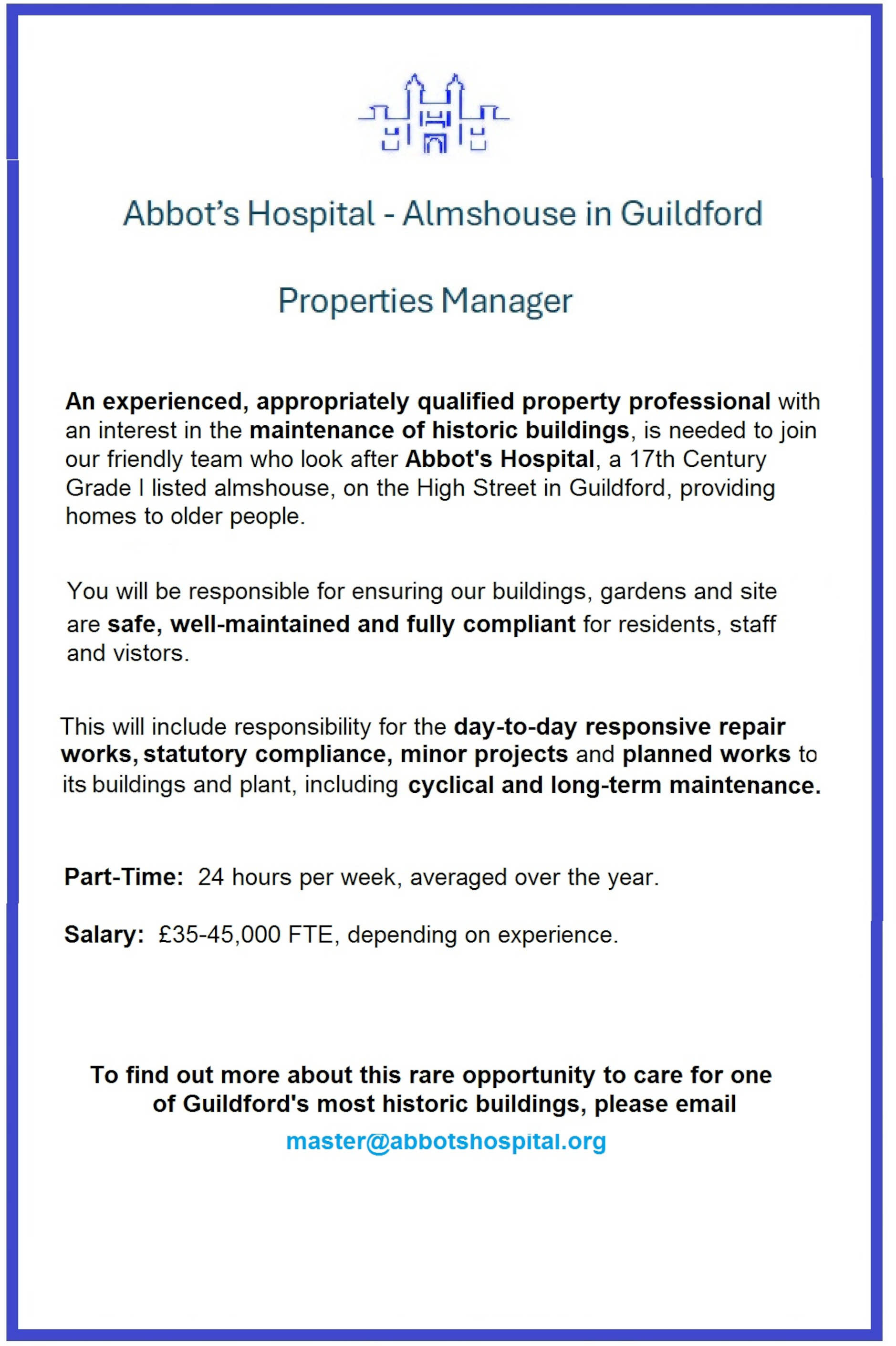


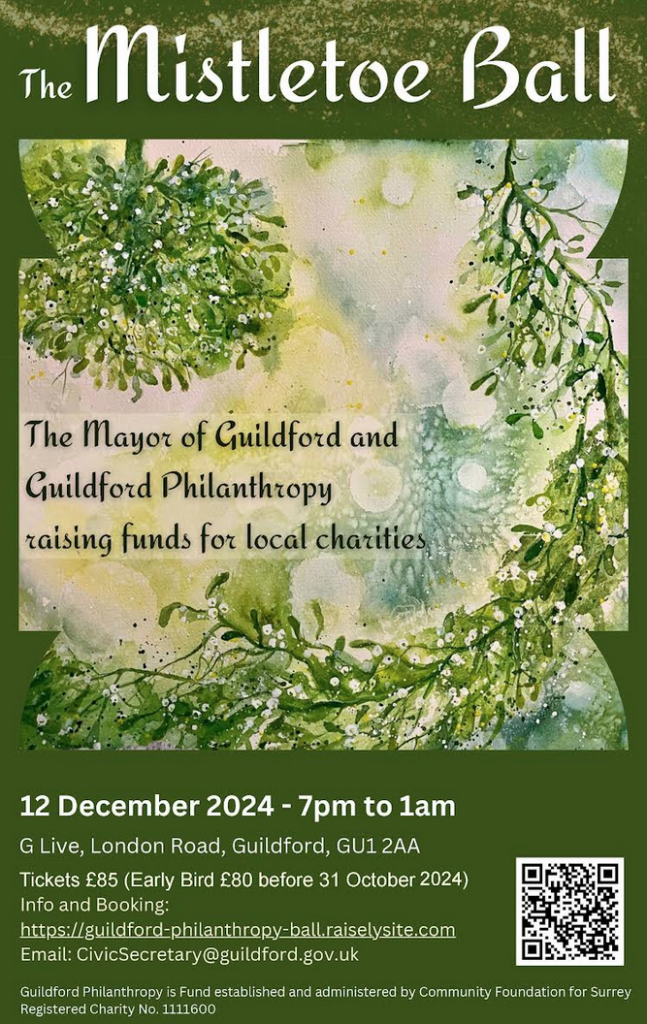

Recent Articles
- Latest Evidence in Sara Sharif Trial
- Ash’s New Road Bridge Is Named – and November 23rd Is Opening Day
- Class A in Underwear Leads to Jail Sentence
- Historical Almshouse Charity Celebrates Guildford in Bloom Victory
- Notice: Shalford Renewable Showcase – November 16
- Firework Fiesta: Guildford Lions Club Announces Extra Attractions
- Come and Meet the Flower Fairies at Watts Gallery
- Updated: Royal Mail Public Counter in Woodbridge Meadows to Close, Says Staff Member
- Letter: New Developments Should Benefit Local People
- Open Letter to Jeremy Hunt, MP: Ash’s Healthcare Concerns


Search in Site
Media Gallery
Dragon Interview: Local Artist Leaves Her Mark At One of England’s Most Historic Buildings
January 21, 2023 / No Comment / Read MoreDragon Interview: Lib Dem Planning Chair: ‘Current Policy Doesn’t Work for Local People’
January 19, 2023 / No Comment / Read MoreA3 Tunnel in Guildford ‘Necessary’ for New Homes, Says Guildford’s MP
January 10, 2023 / No Comment / Read More‘Madness’ for London Road Scheme to Go Ahead Against ‘Huge Opposition’, Says SCC Leader
January 6, 2023 / No Comment / Read MoreCouncillor’s Son Starts Campaign for More Consultation on North Street Plan
December 30, 2022 / No Comment / Read MoreCounty Council Climbs Down Over London Road Works – Further ‘Engagement’ Period Announced
December 14, 2022 / No Comment / Read MoreDragon Interview: GBC Reaction to the Government’s Expected Decision to Relax Housing Targets
December 7, 2022 / No Comment / Read MoreHow Can Our Town Centre Businesses Recover? Watch the Shop Front Debate
May 18, 2020 / No Comment / Read More







Recent Comments